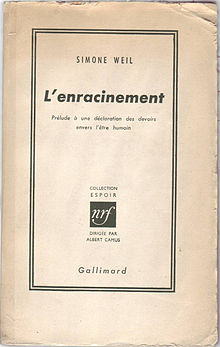The Need for Roots
 |
|
| Author | Simone Weil |
|---|---|
| Country | France, United Kingdom |
| Language | French, English |
| Subject | Politics, culture, philosophy |
| Genre | Non-fiction |
| Publisher | Routledge |
|
Publication date
|
1949 (French), 1952 (English) |
| Media type | Paperback |
| Pages | 298 |
| ISBN | |
The Need for Roots: prelude towards a declaration of duties towards mankind (French: L'Enracinement, prélude à une déclaration des devoirs envers l'être humain) is a book by Simone Weil. It was first published in French in 1949, titled L'Enracinement. The first English translation was published in 1952. Like all of Weil's books it was published posthumously.
The work diagnoses the causes of the social, cultural and spiritual malaise which Weil saw as afflicting 20th century civilisation, particularly Europe but also the rest of the world. 'Uprootedness' is defined as a near universal condition resulting from the destruction of ties with the past and the dissolution of community. Weil specifies the requirements that must be met so that peoples can once again feel rooted, in a cultural and spiritual sense, to their environment and to both the past and to expectations for the future. The book discusses the political, cultural and spiritual currents that ought to be nurtured so that people have access to sources of energy which will help them lead fulfilling, joyful and morally good lives. A leading theme is the need to recognise the spiritual nature of work.
The Need for Roots is regarded as Weil's best known work and has provoked a variety of responses, from being described as a work of "exceptional originality and breadth of human sympathy" to "a collection of egregious nonsense."
The book was written in the early months of 1943. Its initial form was a report which Weil had been asked to write for the Free French Resistance movement concerning the possibilities for effecting a regeneration in France once the Germans had been driven back. The work was originally submitted along with a shorter companion essay called Draft for a statement of human obligations. "Spirituality of work", a leading theme in the book, was a concept that had occupied Weil throughout her career. According to biographer Richard Rees, her whole life's work can be viewed as an attempt to elucidate the concept, which she saw as the one great original idea of the West. Weil presented physical labour as the type of work most suited to develop a direct connection with God. Her analysis was informed by a year-long stretch as a factory hand and by several periods working as an agricultural labourer.
The book is divided into three parts. Part 1 is subdivided into fourteen sections, each dealing with a specific human need. Collectively these are referred to as 'needs of the soul'. Part 2 is subdivided into three sections, dealing with the concept of uprootedness in relation to urban life, to rural life and to nationhood. Part 3 is undivided and discusses the possibilities for inspiring a nation. Only a small part of the book discusses the specific solutions that were of unique applicability to France in the 1940s. Most of the work discusses the general case and is of broad and lasting relevance.
...
Wikipedia
